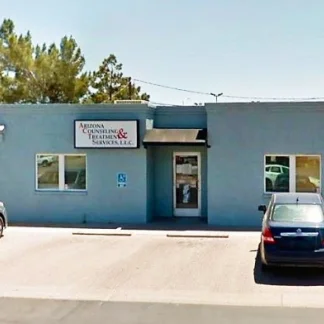Southern Arizona VA Health Care System - Safford CBOC
Southern Arizona VA Health Care System – Safford CBOC offers mental health and a...
Counseling and Treatment Services, in Safford, Arizona, offers mental health and addiction treatment programs for adolescents and adults. Specialized programs are available for young adults, seniors, members of the LGBTQ+ community, military personnel and Veterans, pregnant and postpartum women, and persons with co-occurring disorders. They provide intensive outpatient (IOP), general outpatient (OP), and aftercare programs.
Their intensive outpatient program (IOP) is designed for clients requiring high-level supervision and support, including those stepping down from inpatient treatment, in early recovery, or at an elevated relapse risk. Clients receive medical and mental health assessments and personalized care plans. Referrals for acute and subacute inpatient care are available. Clients also engage in robust individual, group, and family counseling and recovery-focused life-skills training.
Their general outpatient program (OP) allows clients to progress in their recovery journey through continuing addiction counseling and recovery education.
Their aftercare services enable a complete continuum of care aligned with clients’ evolving needs and may include peer coaching, step-down support, and referrals for additional services.
Counseling and Treatment Services may be able to work with major insurers, such as Aetna, BlueCross BlueShield, Cigna, Humana, and United Healthcare, to offset treatment costs. Contact your provider to verify coverage, because out of network benefits may vary.
Contact us for more information: (928) 792-4242

Connect with Counseling and Treatment Services by calling their admissions team directly.
(928) 792-4242 Website Get DirectionsResearch clearly demonstrates that recovery is far more successful and sustainable when loved ones like family members participate in rehab and substance abuse treatment. Genetic factors may be at play when it comes to drug and alcohol addiction, as well as mental health issues. Family dynamics often play a critical role in addiction triggers, and if properly educated, family members can be a strong source of support when it comes to rehabilitation.
Group therapy is any therapeutic work that happens in a group (not one-on-one). There are a number of different group therapy modalities, including support groups, experiential therapy, psycho-education, and more. Group therapy involves treatment as well as processing interaction between group members.
Trauma therapy addresses traumatic incidents from a client's past that are likely affecting their present-day experience. Trauma is often one of the primary triggers and potential causes of addiction, and can stem from child sexual abuse, domestic violence, having a parent with a mental illness, losing one or both parents at a young age, teenage or adult sexual assault, or any number of other factors. The purpose of trauma therapy is to allow a patient to process trauma and move through and past it, with the help of trained and compassionate mental health professionals.
Group therapy is any therapeutic work that happens in a group (not one-on-one). There are a number of different group therapy modalities, including support groups, experiential therapy, psycho-education, and more. Group therapy involves treatment as well as processing interaction between group members.
Trauma therapy addresses traumatic incidents from a client's past that are likely affecting their present-day experience. Trauma is often one of the primary triggers and potential causes of addiction, and can stem from child sexual abuse, domestic violence, having a parent with a mental illness, losing one or both parents at a young age, teenage or adult sexual assault, or any number of other factors. The purpose of trauma therapy is to allow a patient to process trauma and move through and past it, with the help of trained and compassionate mental health professionals.
Trauma therapy addresses traumatic incidents from a client's past that are likely affecting their present-day experience. Trauma is often one of the primary triggers and potential causes of addiction, and can stem from child sexual abuse, domestic violence, having a parent with a mental illness, losing one or both parents at a young age, teenage or adult sexual assault, or any number of other factors. The purpose of trauma therapy is to allow a patient to process trauma and move through and past it, with the help of trained and compassionate mental health professionals.
Southern Arizona VA Health Care System – Safford CBOC offers mental health and a...
Southeastern Arizona Behavioral Health offers mental health and addiction recove...